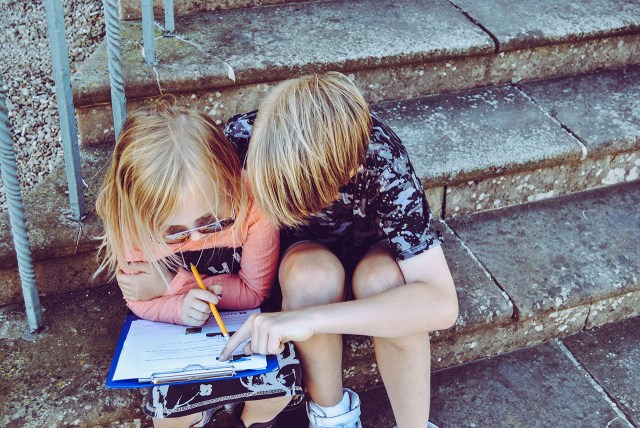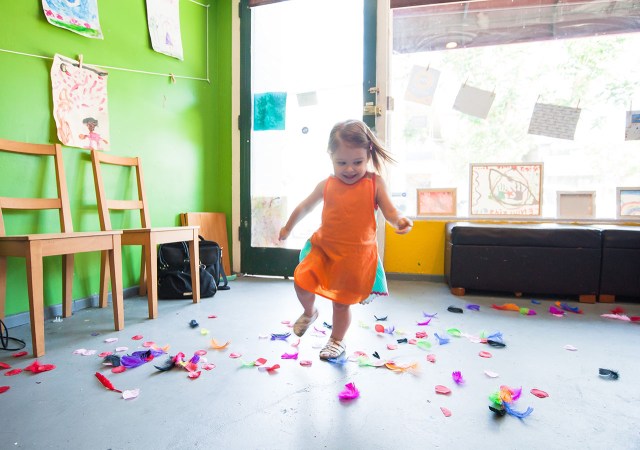For kids, when it comes to heading back to school, reconnecting with classmates and meeting new teachers can be thrilling, but the process can also provoke a mix of excitement and anxiety too (especially if it’s their first time back since 2020). We found a few experts to weigh in on the best ways to quell those first-day butterflies. See what they had to say below.

1. Start adjusting schedules now. The first day of school might be a few days (or weeks) away, but it’s never too early to start re-adjusting schedules back to early morning mode. That means switching from late nights and lazy mornings to reasonable bedtimes and early rising.
2. Do a practice run. Before school starts, it’s helpful for students and parents to familiarize themselves with a new school or a new classroom. Visit the school during the summer break and, if possible, visit the classroom where your child will be attending. Mark Griffin, the headmaster of Eagle Hill School in Connecticut, says a classroom visit can help to alleviate the fear of the unknown for an anxious student.
3. Involve your child in decision making. Whether it’s encouraging your kid to pick out her new school supplies or asking your child what he wants to pack for lunch, letting them have a say in what they can expect in the coming school year will give them a sense of control and confidence. Eleanor Mackey, a psychologist with Children's National Health System in Washington, D.C., says allowing kids to be engaged with finding solutions can help them feel better about potentially scary situations.

4. Validate your child’s feelings. Some parents may dismiss a child’s fears of going back to school or miss cues that may reveal something deeper than mere nervousness. “Kids are resilient, but it’s good to validate what they are feeling,” says Allison Wilson, director of curriculum and innovation at Stratford School in Southern and Northern California. “Parents sharing their own stories about their first day of school or about other changes they’ve experienced can resonate with kids and make them feel less worried.”
5. Establish a routine. Going back to school signals the return of the ultimate routine for students and parents. Beyond re-establishing healthy bedtime and waking schedules, well-kept routines like homework, after-school activities, and mealtimes can help students focus on being prepared at school and help families get back into the swing of balancing academics and social lives.
6. Talk about it. Wilson encourages parents to be open to talking about a child’s fears before and after the start of the new school year. “Dialogue can be open-ended, but ask specific questions,” Wilson says. “Don’t ask general questions like, ‘How was your day?’ Be specific, ‘What did you draw in art class today?’ ” In addition, Wilson says parents should model open talk by sharing the highs and lows of their own days.

7. Remember that one size does not fit all. A variety of factors may influence the impact of going back to school and any corresponding anxiety that a student feels. Whether it’s a kindergartner starting full-day school or a middle schooler transitioning to using a locker for the first time, it’s important to recognize that not every child will have the same reactions to new situations. Scholastic offers some helpful tips for ensuring that each kid gets the kind of individualized support they need, including not assuming that your child’s experience will be the same as yours in school.
8. Consider different milestones. In the same way that not all students will experience similar levels of anxiety at the start of the school year, it’s important to consider the differences between entering different grades, different schools or different social dynamics. Meeting your child where she is and the circumstances surrounding the changes being experienced—rather than forcing your perspectives and fears onto your child—will help to calm nerves.
9. Do your homework. There are plenty of resources that can help parents and students cope with back-to-school anxiety, including a wide variety of books that address the topic in humorous and relatable ways for kids. From The Pout Pout Fish Goes to School to Second Grade, Here I Come!, reading stories with your child about what it’s like to go back to school can be a fun, shared activity. Find our favorite back-to-school reads here.

10. Don’t prejudge too quickly. As parents, we like to believe that we’re attuned to what’s going on with our own kid at all times, but sometimes we may mistakenly diagnose back-to-school anxiety when the culprit might be something else entirely. Wilson says, “Maybe it’s not fear or anxiety. The jitters could be excitement or simply not knowing what’s ahead.” Active listening and supporting your child can help to discern the difference between an issue that’s big or small.
11. Host a playdate. Johns Hopkins School of Medicine Children’s Center provides useful resources and tips for parents and students coping with back-to-school anxiety, including hosting an after-school playdate with a fellow student in order to start getting acclimated to being around classmates before the first day of school.
12. Review past successes. Although the previous school year may seem light-years away, reviewing with your child his successful completion of the prior school year will help set him up for success in the coming year. Jessica Borelli, associate professor of psychology at the University of California, Irvine, says reminding a student of their past achievements will help build confidence for the impending new school year.

13. Have one last hurrah. Before the start of school, spend some quality time together as a family. Take a road trip, splurge on a fancy family meal, or have a surprise adventure. Arming kids with fond memories of what they did over the summer, aside from sleeping in or going to the beach or pool, will give them conversation starters with their peers and fuel them to get through the first few weeks and months of classes.
14. Get organized. In the days and weeks leading up to the start of school, make sure supplies are purchased, pantries are well-stocked, and back-to-school clothes are ready to go. Nothing exacerbates back-to-school jitters like disorganization and chaos at home.
15. Keep calm and carry on. “Children are really intuitive and adults sometimes don’t see that,” says Wilson. “We may be projecting our own anxieties on our children, which can make the situation worse.” Instead of obsessing about the unknown with your child, remain collected and focused on all of the positive aspects of starting a new school year.
RELATED STORIES:
13 Reasons to Be Excited about Back to School
Back to School Tips to Start the New Year Off Right
15 Thoughts Every Parent Secretly Has about Back to School

Need some fresh ideas?
Subscribe to our weekly newsletter for expert parenting tips and simple solutions that make life instantly better.
By subscribing you agree to Tinybeans Terms and Privacy Policy











